- Home
- Mildred A. Wirt
The Girl Detective Megapack: 25 Classic Mystery Novels for Girls Page 3
The Girl Detective Megapack: 25 Classic Mystery Novels for Girls Read online
Page 3
“Aunt Mattie did everything but torture me to get a confession out of me. She said if I didn’t own up to it and give it back she’d send me to a reform school, and I’d be branded as a criminal for the rest of my life.”
“She couldn’t do that!” exclaimed Mary Louise furiously. “If she has no proof… I’ll tell you what I’ll do, Elsie! I’ll put my father on the case when he comes home! He’s a detective on the police force, and he’s just wonderful. He’ll find the real thief.”
Elsie shook her head.
“No, I’m afraid you can’t do that. Because Aunt Mattie distinctly said that she won’t have the police meddling in this. She says that if I didn’t steal the money somebody else in the family did.”
“What family?”
“Aunt Grace’s family. She’s the Mrs. Grant, you know, who lives in Riverside. She has three grown-up children and one grandchild. Aunt Mattie says one of these relatives is guilty, if I’m not, and she’ll find out herself, without bringing shame upon the Grant name.”
Mary Louise groaned.
“The only thing I can see for us to do, then, is to be detectives ourselves. Jane and I will do all we can to help you, won’t we, Jane?”
Her chum nodded. “At least, if we don’t have to get into any spookiness at night,” she amended. “Those mysterious sounds you told us about, Elsie—”
“They may all have some connection with this robbery,” announced Mary Louise. “And I’d like to find out!”
Elsie looked doubtful.
“I only hope Aunt Mattie doesn’t try the bread-and-water diet on me, to get a confession. Really, you have no idea how awful that is till you try it. You just get crazy for some real food. You’d be almost willing to lie to get it, even if you knew the lie was going to hurt you.”
“If she tries that, you let us know,” cried Jane angrily, “and we’ll bring our parents right over here!”
“All right, I will.” Elsie seemed to find some relief in the promise.
“Elsie,” said Mary Louise very seriously, “tell me who you really think did steal the money.”
The girl considered the problem carefully.
“I believe it was somebody in Aunt Grace’s family,” she replied slowly. “Because they used to be rich, and now they are poor. And I think that if a burglar had entered the house, somebody, probably Aunt Mattie, would have wakened up.”
“Couldn’t he have entered before your aunt went to bed?” suggested Mary Louise.
“Maybe. But Aunt Mattie was on the front porch all evening, and she’d probably have heard him.”
“All right, then,” agreed Mary Louise. “Let’s drop the idea of the burglar for the time being. Let’s hear about the family—your aunt Grace’s family, I mean.”
She reached into her pocket and took out a pencil and notebook, which she had provided for the purpose of writing down any items of clothing that Elsie might particularly want. Instead of that, she would list the possible suspects, the way her father usually did when he was working on a murder case.
“Go ahead,” she said. “I’m ready now. Tell me how many brothers and sisters your aunt Mattie had, and everything else you can.”
“Aunt Mattie had only two brothers, and not any sisters at all. My father was one brother, and Aunt Grace’s husband was the other. They’re both dead.”
“Then your aunt Grace isn’t your aunt Mattie’s real sister?” inquired Jane.
“No. But Aunt Mattie seems to like her better than any of her blood relations, even if she is only a sister-in-law. She comes over here pretty often.”
“Maybe she took the money.”
Elsie looked shocked.
“Not Aunt Grace! She’s too religious. Always going to church and talking about right and wrong. She even argued with Aunt Mattie to let me go to Sunday school, but Aunt Mattie wouldn’t buy me a decent dress.”
At the mention of clothing, Jane reached for the package they had carried with them to Dark Cedars, but Mary Louise shook her head, signaling her to wait until Elsie had finished.
“Well, anyway, Aunt Mattie’s father liked her better than her two brothers, and he promised to leave her his money if she wouldn’t get married while he was alive. And she didn’t, you know.”
“I guess nobody ever asked her,” remarked Jane bluntly.
“That’s what my mother used to say,” agreed Elsie. “She didn’t like Aunt Mattie, and Aunt Mattie hated her. So it’s no wonder I’m not welcome here!”
Mary Louise called Elsie back to her facts by tapping her pencil on her notebook.
“So far I have only one relative written down,” she said. “That’s your aunt Grace. Please go on.”
“As I told you, I think,” Elsie continued immediately, “Aunt Grace has three grown children. Two boys and a girl.”
“Names, please,” commanded Mary Louise in her most practical tone.
“John Grant, Harry Grant, and Mrs. Ellen Grant Pearson. The daughter is married.”
“How old are they?”
“All about forty, I guess. I don’t know. Middle-aged—no, I guess you wouldn’t call Harry middle-aged. He’s the youngest. Except, of course, the granddaughter—Mrs. Pearson’s only child. She’s a girl about eighteen or nineteen.”
“What’s her name?”
“Corinne—Corinne Pearson.”
“Is that everybody?” asked Mary Louise. “I mean, all the living relatives of Miss Mattie Grant?”
“Yes, that’s all.”
Mary Louise read her list aloud, just to make sure that she had gotten the names correctly and to impress them upon her own mind.
“Mrs. Grace Grant—aged about sixty-five, sister-in-law of Miss Mattie.
“John Grant—middle-aged.
“Ellen Grant Pearson—middle-aged.
“Harry Grant—about thirty.
“Corinne Pearson—about nineteen.…”
“But you forgot me!” Elsie reminded her.
“No, we didn’t forget you, either,” replied Mary Louise, with a smile. “We’ve got something for you—in that package.”
“Something to make you forget your troubles,” added Jane. “Some new clothes.”
The girl’s eyes lighted up with joy.
“Honestly? Oh, that’s wonderful! Let me see them!”
Mary Louise untied the package and held the things up for Elsie to look at. The girl’s expression was one of positive rapture. A silk dress! In the latest style! And the kind of soft wooly coat she had always dreamed of possessing! A hat that was a real hat—not one of those outlandish sunbonnets her aunt Mattie made her wear! Dainty lingerie—and a pair of white shoes!
“Oh, it’s too much!” she cried. “I couldn’t take them! They’re your best things—I know they are.” And once again her eyes filled with tears.
“We have other nice clothes,” Mary Louise assured her. “And our mothers said it was all right. So you must take them: we’d be hurt if you didn’t.”
“Honestly?” The girl looked as if she could not believe there was so much goodness in the world.
“Absolutely! Now—don’t you want to go in and try them on?”
“I’ll do it right here,” said Elsie. “These cedars are so thick that nobody can see me. And if I went into the house they might not let me out again to show you.”
With trembling fingers she pulled off her shoes and stockings, and the old calico dress she was wearing, and put on the silk slip and the green flowered dress. Then the white stockings and the slippers, which fitted beautifully. And last of all, the coat.
Her eyes were sparkling now, and her feet were taking little dancing steps of delight. Elsie Grant looked like a different person!
“Wonderful!” cried Mary Louise and Jane in the same breath.
“Only—let me fix your hair,” suggested the former. “It’s naturally curly, isn’t it? But you have it drawn back so tightly you can scarcely see any wave.”
“I’d like to wear it like yours, M
ary Louise,” replied the orphan wistfully. “But it’s too long, and I have no money for barbers or beauty parlors.”
“We’ll see what we can do next time we come,” answered Mary Louise. “But let’s loosen it up a bit now and put your knot down low on your neck so that the hat will fit.”
Deftly she fluffed it out a little at the sides and pinned it in a modish style. Then she put the little white felt hat on Elsie’s head at just the correct angle and stepped back to survey the transformed girl with pride.
“You’re positively a knockout, Elsie!” she exclaimed in delight. “Take my word for it, you’re going to be a big hit in Riverside.” She chuckled to herself. “We’ll all lose our boy-friends when they see you!”
“Oh no!” protested Elsie seriously. “You are really beautiful, Mary Louise! And so clever and good. And so is Jane.”
Both girls smiled at Elsie’s extravagant praise. Then Mary Louise turned back to her notebook.
“I’d like to hear more about yesterday,” she said: “whether you think any of these five relatives had a chance to steal that money.”
“They all had a chance,” answered Elsie. “They were all here—and all up in Aunt Mattie’s room at some time or other during the day or evening!”
CHAPTER III
Suspects
“Let’s sit down again while you tell me every single thing that happened here yesterday,” suggested Mary Louise.
Elsie took off the white coat and folded it carefully. Then she removed her hat.
“But I can’t sit down in this silk dress,” she objected. “I might get it dirty, and I don’t want to take it off till I see myself in a mirror. I might not have another chance to put it on all day long!”
“You can sit on the paper,” advised Jane. “That will protect it. Besides, the ground is dry, and these needles are a covering.”
Very cautiously Elsie seated herself, and turned to Mary Louise, who had dropped down beside her on the ground.
“Begin when you got up in the morning,” she said.
“That was about seven o’clock,” replied Elsie. “But really, that doesn’t matter, because I’m sure Aunt Mattie counted her money after you girls brought the kitten back. I heard her. And she stayed in her room until after lunch.”
“Does this safe have a combination lock?” inquired Mary Louise.
“No, it doesn’t. Just a key. John Grant suggested to Aunt Mattie that she have one put on, and she refused. She said people can guess at combinations of figures by twisting the handle around, but if she kept the key with her day and night, nobody could open the safe.… But she got fooled!”
“The lock was broken?”
“Yes. But the door of the safe was closed, so she hadn’t noticed it until she went to count her money this morning.”
“Do you know how much was taken?”
“No, I don’t. Plenty, I guess. Only, there was one queer thing about it: the thief didn’t take the bonds she kept in a special drawer.”
“Overlooked them, probably,” remarked Mary Louise.
“Maybe. I don’t know. Well, as I said, Aunt Mattie was in her room until lunch time, and then she went out on the front porch. About two o’clock in the afternoon Aunt Grace and her son John drove over.”
“John—Grant,” repeated Mary Louise, consulting the list in her notebook. “He’s your aunt Grace’s oldest son?”
“Yes. He’s about forty, as I said. Fat and a little bit bald. An old bachelor. Probably you’d recognize him if you saw him, because he’s on the School Board. Aunt Mattie likes him because he does little repair jobs for her around the house that save her spending money for a carpenter.
“Yesterday he went upstairs and fixed a window sash in her bedroom.” Elsie paused thoughtfully. “So you see John had a good chance to open the safe and steal the money.”
“Why, he’s the guilty one, of course!” cried Jane instantly. “It’s just too plain. I should think your aunt would see that.”
Elsie shook her head.
“No, it would never occur to Aunt Mattie to accuse John. He’s the one person in the family she trusts. She always says she is leaving him all her money in her will—so why would he bother to steal it?”
“He might need it now, for some particular purpose,” replied Jane. “He is handy with tools, you say—and had such a good opportunity.”
“We better get on with the story,” urged Mary Louise. “Any minute Elsie may be called in.”
The girl shuddered, as if she dreaded the ordeal of meeting her aunt again.
“Was your aunt Grace in the bedroom at all during the afternoon?” questioned Mary Louise. “By herself, I mean?”
“I don’t know. She and Aunt Mattie went up together to look at the window after John finished fixing it, but whether or not Aunt Grace was there alone, I couldn’t say. Anyhow, there’s no use worrying about that. Aunt Grace just couldn’t steal anything.”
“According to the detective stories,” put in Jane, “it’s the person who just couldn’t commit the crime who always is the guilty one. The one you suspect least.”
“But this isn’t a story,” said Elsie. “I wish it were. If you knew how dreadful it is for me, living here and having everybody think I’m a thief!”
“Why don’t you run away, now that you have some decent clothes?” suggested Jane. “I just wouldn’t stand for anything like that!”
“But I have nowhere to go. Besides, running away would make me look guiltier than ever.”
“Elsie’s right,” approved Mary Louise. “She can’t run away now. But we’ll prove she’s innocent!” she added, with determination.
“There’s something else that happened during that visit,” continued Elsie. “I mean, while Aunt Grace and John were here. Part of a conversation I overhead that may give you a clue. Aunt Grace said her youngest son—Harry, you remember—had gotten into debt and needed some money very badly. She didn’t actually ask Aunt Mattie to help him out: she only hinted. But she didn’t get any encouragement from Aunt Mattie. She told Aunt Grace just to shut Harry out of the house till he learned to behave himself!”
“So this Harry Grant is in debt!” muttered Mary Louise, making a note of this fact in her little book. “Could he have stolen the money?”
“Yes, it’s possible. After Aunt Grace and John went home, Harry came over to Dark Cedars.”
“What time was that?”
“Around four o’clock, I think. I was out in the kitchen, helping Hannah shell some peas for supper. We heard his car—it’s a terribly noisy old thing—and then his voice.”
“What’s he like?” asked Mary Louise.
“I told you he was the youngest of Aunt Grace’s children, you know, and he’s rather handsome. He treats me much better than any of the other relations, except Aunt Grace, but still I don’t like him. He always insists on kissing me and teasing me about imaginary boy-friends. I usually run out into the kitchen when I hear him coming.”
“Is he here often?”
“Only when he wants something. He tries to flatter Aunt Mattie and tease her money away from her. But, as far as I know, he never gets any.”
“What did he want yesterday?”
“He said he wanted a loan. He didn’t bother to talk quietly: I could hear every word he said from the kitchen.”
“And your aunt refused?”
“Yes. She told him to sell his car if he needed money. As if he could sell that old bus!” Elsie laughed. “You’d have to pay somebody to take that away,” she explained.
Mary Louise tapped her pencil again. She hated to get away from the all-important subject.
“But how do you think Harry could have stolen the money if your aunt Mattie was with him all the time?” she asked.
“Aunt Mattie wasn’t. He had a fine chance. Something had gone wrong with his car, and he had to fix it on the way over. So his hands were all dirty, and he went upstairs to wash them.”
“Oh!” exclaimed Jane si
gnificantly.
“Looks bad for Harry Grant,” commented Mary Louise, “because he had a motive. Daddy always looks for two things when he’s solving a crime: the motive, and the chance to get away with it. And it seems that this young man had both.”
Elsie nodded.
“Yes, he had. And he was upstairs a good while, too. But then, he’s an awful dandy about everything. You never see grease in Harry Grant’s finger nails!”
“Did he go right out when he came downstairs?” inquired Mary Louise.
“No. He laughed and joked a lot. I heard him ask Aunt Mattie to lend him her finger-nail rouge because he had forgotten his. Then he said he’d like some cookies, and I had to make lemonade.”
“So, if he took the money, he must have had it in his pocket all this time? He didn’t go upstairs again?”
“No, he didn’t. And I know Aunt Mattie had a good deal of it in gold, so it must have been terribly heavy. Still, men have a lot of pockets.”
Mary Louise nodded. “Yes, that’s true. But you’d think if he really had taken it he’d have been anxious to get away. That story about asking for cookies and lemonade almost proves an alibi for him.”
She sighed; it was all getting rather complicated. “Did anything else happen yesterday?” she asked wearily. “I mean, after Harry went home?”
“Not till after supper. Then Mrs. Pearson and her daughter walked over to see Aunt Mattie. They used to be rich, but Mr. Pearson lost his job, and they had to sell their car. So now they have to walk wherever they go.”
Jane let out a groan.
“So every one of those five relations of Miss Grant was here yesterday and had a chance to steal that money!” she exclaimed.
“Yes,” agreed Elsie. “Every one of them!”
“What are the Pearsons like?” asked Mary Louise.
“Well, Mrs. Pearson looks like Aunt Grace—she’s her daughter, you remember—but she isn’t a bit like her. She isn’t religious; in fact, she doesn’t seem to care for anything in the world but that nasty daughter of hers. Corinne, you know. Have you ever seen Corinne Pearson?”
“I think I have,” replied Mary Louise. “Though she never went to our school. I believe she attended that little private school, and now she goes around with the Country Club set, doesn’t she?”

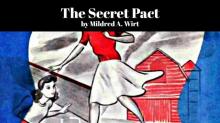 The Secret Pact
The Secret Pact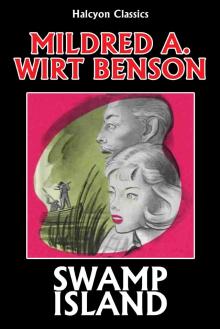 Swamp Island
Swamp Island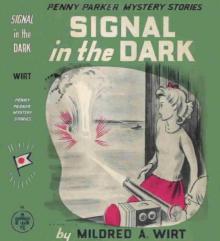 Signal in the Dark
Signal in the Dark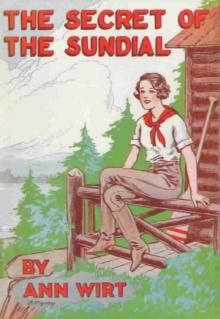 The Secret of the Sundial
The Secret of the Sundial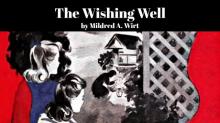 The Wishing Well
The Wishing Well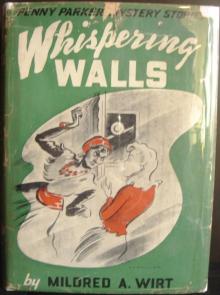 Whispering Walls
Whispering Walls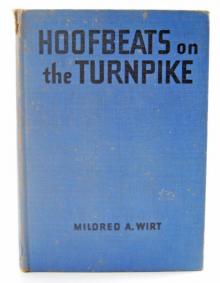 Hoofbeats on the Turnpike
Hoofbeats on the Turnpike The Deserted Yacht
The Deserted Yacht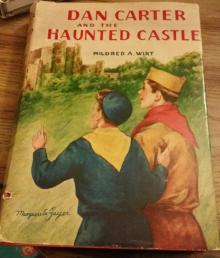 Dan Carter and the Haunted Castle
Dan Carter and the Haunted Castle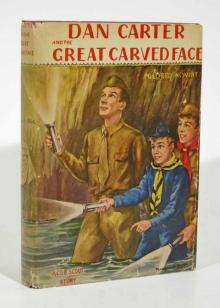 Dan Carter and the Great Carved Face
Dan Carter and the Great Carved Face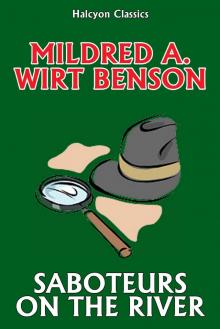 Saboteurs on the River
Saboteurs on the River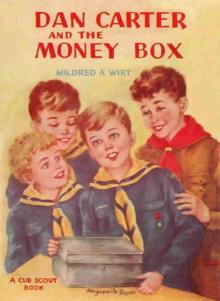 Dan Carter and the Cub Honor
Dan Carter and the Cub Honor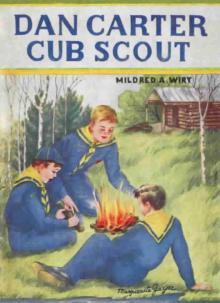 Dan Carter-- Cub Scout
Dan Carter-- Cub Scout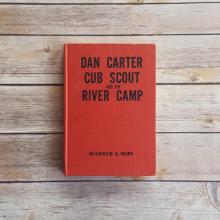 Dan Carter, Cub Scout, and the River Camp
Dan Carter, Cub Scout, and the River Camp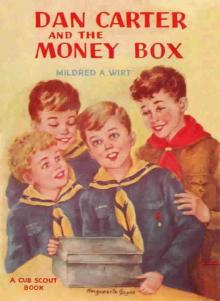 Dan Carter and the Money Box
Dan Carter and the Money Box The Girl Detective Megapack: 25 Classic Mystery Novels for Girls
The Girl Detective Megapack: 25 Classic Mystery Novels for Girls